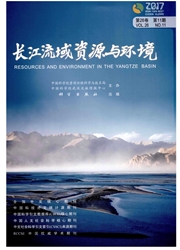

 中文摘要:
中文摘要:
地理加权回归克里金(GWRK)是在地理加权回归(GWR)基础上扩展得到的一种既能考虑回归关系的空间非平稳性又能考虑回归变量空间自相关性的降水数据融合方法。以赣江流域为例,在评价TRMM卫星数据精度的基础上,分别以GWRK和GWR方法构建了站点-卫星降水数据融合模型,然后采用降水融合数据驱动GR4J水文模型进行水文预报。根据站点尺度降水融合数据精度及水文预报表现,对GWRK和GWR构建的降水融合模型效果进行评价,结果表明:较之GWR方法,GWRK方法能较明显的提高降水融合数据在站点尺度上的精度,但是由于输入到水文模型中的数据为面降水数据,受空间均化的影响,对水文预报精度的提高不如对站点尺度降水融合数据精度的提高明显。
 英文摘要:
英文摘要:
Geographically weighted regression kriging( GWRK) is one type of precipitation data processing method which is developed from the geographically weighted regression( GWR). GWRK could consider both variables' spatial autocorrelation and regression 's spatial non-stationary. This study is a case research that compares how the efficiencies of GWRK and GWR work on the Ganjiang River basin precipitation dataset,and the comparison is carried out via three below steps. Firstly,the basin Tropical Rainfall Measuring Mission( TRMM) precipitation data was validated. Secondly,the GWRK and GWR methods were applied to create the"station-TRMM"merging precipitation model separately. At last,the merging precipitation data was used to drive the GR4 J hydrological model to perform hydrological projection. The comparison showed that GWRK method could obviously improve the precipitation merging data accuracy at station scale. The improvement of hydrological projection's accuracy,however,was not as high as that of station precipitation data,that is mostly due to the hydrological model inputting data are homogenized large-scale precipitation data,which are quite different to"point-to-point"precipitation dataset.
 同期刊论文项目
同期刊论文项目
 同项目期刊论文
同项目期刊论文
 期刊信息
期刊信息
